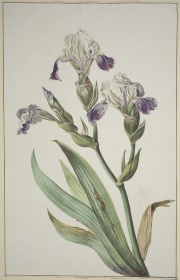Difference between revisions of "Iris green"
Jump to navigation
Jump to search
m (Text replace - "== Authority ==" to "== Sources Checked for Data in Record ==") |
|||
| Line 8: | Line 8: | ||
sap green; lily green; lilly green | sap green; lily green; lilly green | ||
| − | == | + | == Sources Checked for Data in Record == |
* R. J. Gettens, G.L. Stout, ''Painting Materials, A Short Encyclopaedia'', Dover Publications, New York, 1966 | * R. J. Gettens, G.L. Stout, ''Painting Materials, A Short Encyclopaedia'', Dover Publications, New York, 1966 | ||
Revision as of 05:42, 1 May 2016
Description
An obsolete organic green colorant extracted from the crushed flowers of iris or lilies. The clear green color was precipitated on Alumina trihydrate and used in manuscript painting. Iris green was replaced in the 17th century by Sap green which was made from unripe buckthorn berries. The color of the two materials were similar and the name, iris green, was sometimes used for the sap green extract.
Synonyms and Related Terms
sap green; lily green; lilly green
Sources Checked for Data in Record
- R. J. Gettens, G.L. Stout, Painting Materials, A Short Encyclopaedia, Dover Publications, New York, 1966
- Ralph Mayer, A Dictionary of Art Terms and Techniques, Harper and Row Publishers, New York, 1969 (also 1945 printing)
- R.D. Harley, Artists' Pigments c. 1600-1835, Butterworth Scientific, London, 1982
- Art and Architecture Thesaurus Online, http://www.getty.edu/research/tools/vocabulary/aat/, J. Paul Getty Trust, Los Angeles, 2000
